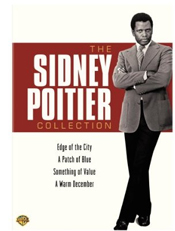
 |
|
|
|

Warners' four-title Sidney Poitier Collection combines the already-available A Patch of Blue with three other films starring the first mainstream African-American movie superstar. One of the titles, Edge of the City is significant from a number of angles. Usually pigeonholed as an On the Waterfront wanna-be, the 1957 picture was given a tiny release and then mostly forgotten by all but admiring film critics. Edge of the City began in 1955 as A Man is Ten Feet Tall, a live production on the Philco Television Playhouse during the fabled Golden Age of Live Television. It was directed by Robert Mulligan and starred Sidney Poitier as Tommy Tyler, a New York freight porter who befriends Axel Nordmann (Don Murray), a scared young man on the run as a deserter from the Army. While Axel tries to sort out personal problems with his family, Tommy introduces him to a young teacher and tries to run interference with an abusive, racist work gang leader, Charlie Malick (Martin Balsam). TV and film producer David Susskind reassembled a film version two years later, with some significant talent changes. Poitier of course remained, but the key hire was Martin Ritt as director. Ritt had been blacklisted in 1951 and '52 even though he was not officially named by the House Un-American Activities Committee, and had to restrict himself to theater work while his colleagues went on to make television history. Edge of the City was Ritt's first film, which shows the clout producer must have carried with the distributor MGM. The film's new cast members are a mix of hot talent. Top billed John Cassavetes was at this time a method actor who was already conducting his own acting workshops. The villainous Charlie Malick role was taken by Jack Warden, another familiar TV name with a number of Hollywood supporting credits. Kathleen Maguire was busy in New York television and theater and Ruby Dee had already appeared in ten Hollywood pictures, including Poitier's No Way Out. Edge of the City is definitely the work of a social critic. Robert Alan Aurthur's screenplay puts the drifter Axel Nordmann in a double bind. Axel joined the Army to escape his father (Robert Simon), who blames him for the death of an older brother. Unable to handle the Army, Axel's now a hunted man. When he meets the almost too-friendly Tommy Tyler he barely knows how to behave. Tommy takes his new friend home to his wife Lucy (Ruby Dee) and fixes him up with a double date. Teacher Ellen Wilson (Kathleen Maguire) is also almost too welcoming, forever smiling at Axel and trying to bring out him of his shell. The unexpected human kindness encourages Axel to reconnect with his family again. His mother (Ruth White of Midnight Cowboy) breaks into tears at the sound of his voice on the phone. But work on the loading dock is a different kettle of fish. When Charlie Malick finds out Axel's secret, he forces the new hire to kick back a sizeable part of his paycheck and then harasses him just for spite. Tommy Tyler laughs at Malick's attempts to bait him with racist remarks, and Malick continues to bully Axel as a way of attacking Tommy. The rest of the crew (including Val Avery, an actor who would later appear in John Cassavetes' own productions) stands by passively. Edge of the City is at heart a liberal fable with a socially progressive message; although transferred to the big screen, it retains the intimate, one-act feel of a TV teleplay. Many scenes involve people trying to express their feelings.Axel isn't considered a criminal deserter but a lost soul in need of kindness and healing. The freight yard is a place of corruption and indifference that encourages malignant creeps like Charles Malick. The cheerful and optimistic Tommy is surely headed for martyrdom, as if he's too virtuous to live. Axel eventually takes responsibility for himself, providing an uplifting ending. Thankfully, the film is free of "author's message" moments where characters directly discuss the theme. John Cassavetes holds screen center at all times with his magnetic performance. He makes fairly corny scenes -- an awkward first date, a tearful phone call to his mother -- and makes them into something special. Poitier is certainly good but limited by the writing. Cassavetes gets to react and behave, and seems all the more real. Martin Ritt stages most scenes in a more relaxed manner than is normal for Hollywood, especially when the two couples are just having fun together. The violent ending, a racially mixed fight with bailing hooks, was something new to screens in 1957. The next year's highly publicized The Defiant Ones took home the prize for daring to bridge the race gap in movies, yet plays it safe in comparison to Ritt's movie. Poitier and Ritt would work together again, in 1961's Paris Blues. Warners' DVD of Edge of the City has been given a fine enhanced B&W transfer. The interesting, low-key main titles are by Saul Bass. Some of the scenes on the New York streets have a semi-improvised quality that John Cassavetes would later take to an extreme in his own work. The one extra is a trailer that uses the film's alternate title, A Man is Ten Feet Tall.
On a scale of Excellent, Good, Fair, and Poor,
Reviews on the Savant main site have additional credits information and are often updated and annotated with reader input and graphics. Also, don't forget the 2009 Savant Wish List. T'was Ever Thus.
Review Staff | About DVD Talk | Newsletter Subscribe | Join DVD Talk Forum |
| ||||||||||||||||||